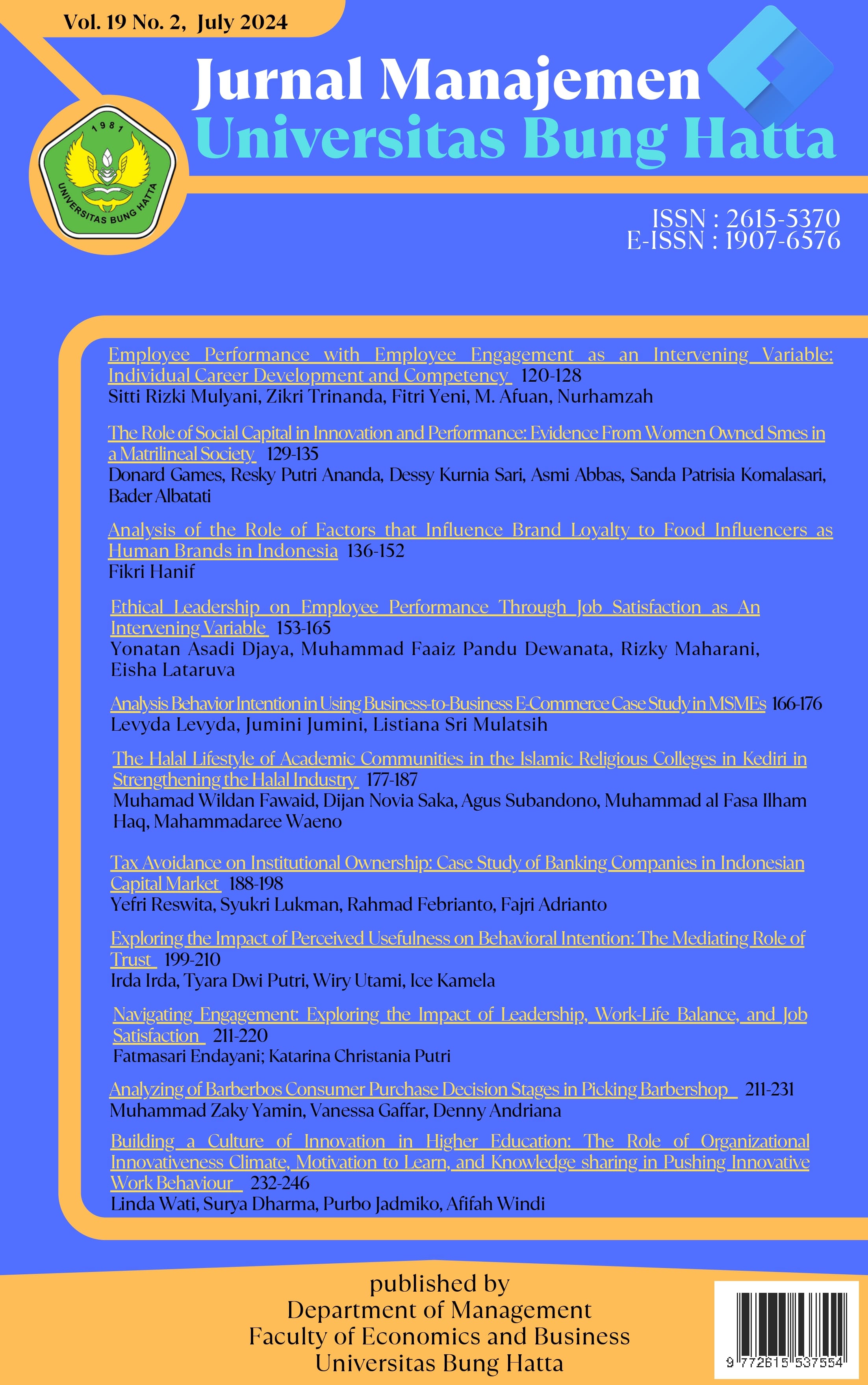The Halal Lifestyle of Academic Communities in the Islamic Religious Colleges in Kediri in Strengthening the Halal Industry
DOI:
https://doi.org/10.37301/jmubh.v19i2.24429Abstract
Halal refers to the laws outlined by Allah in the Quran for permissible actions and practices based on Sharia principles. As a Muslim-majority country, Indonesia aspires to be a global leader in the implementation of the Halal lifestyle, with higher education institutions acting as change agents. This research combined quantitative and qualitative methods. The results of the analysis revealed that all dependent variables have a significant relationship simultaneously with the independent variable, namely Lifestyle. There are two types of effects on lifestyle: positive and negative. Reference Group, Family, Personality, Perception, Motives, and Demographics are the factors that show a positive effect. Culture and Experience, on the other hand, have a negative effect. Overall, the academic community at Kediri's Islamic Religious College is very supportive of the halal industry.
References
Adinugraha, H. H., Nasution, I. F. A., Faisal, F., Daulay, M., Harahap, I., Wildan, T., Takhim, M., Riyadi, A., & Purwanto, A. (2021). Halal Tourism in Indonesia: An Indonesian Council of Ulama National Sharia Board Fatwa Perspective. The Journal of Asian Finance, Economics and Business, 8(3), 665–673. https://doi.org/10.13106/JAFEB.2021.VOL8.NO3.0665
Ali, A. (2010). Menguak Teori Hukum (Legal Theory) dan Teori Peradilan (Judicial prudence) Termasuk Interprestasi Undang-Undang (Legis prudence): Pemahaman Awal (Vol. 1). Kencana Prenadamedia Group.
Alif Rusmita, S., Nafik, M., Ryandono, H., Filianti, D., Che, M., & Salleh, M. (2021). Islamic Economic Students Knowledge and Attitude Toward Halal Pharmacy Product in East Java, Indonesia. Al-Uqud : Journal of Islamic Economics, 5(1), 1–15. https://doi.org/10.26740/AL-UQUD.V5N1.P1-15
Ashari, R., Muda, P., & Provinsi Kepulauan Bangka Belitung, B. (2021). Pengembangan Sistem Logistik Produk Halal di Indonesia. Halal Research Journal, 1(1), 8–19. https://doi.org/10.12962/J22759970.V1I1.13
Asia, S. (2019). Economic Outlook for Southeast Asia, China and India 2020 (Summary in Arabic). https://doi.org/10.1787/fa3db848-ar
Friedman, L. M., & Hayden, G. M. (2017). American Law: An Introduction (3rd ed.). Oxford University Press.
Halal dan Implikasinya Bagi Bisnis Produk Halal di Indonesia Warto, S. (2020). Sertifikasi Halal dan Implikasinya Bagi Bisnis Produk Halal di Indonesia. Al Maal: Journal of Islamic Economics and Banking, 2(1), 98–112. https://doi.org/10.31000/ALMAAL.V2I1.2803
Hendren, K., Newcomer, K., Pandey, S. K., Smith, M., & Sumner, N. (2023). How qualitative research methods can be leveraged to strengthen mixed methods research in public policy and public administration? Public Administration Review, 83(3), 468–485. https://doi.org/10.1111/PUAR.13528
Hidayah, N. P., Komariah, K., Esfandiari, F., & Jaelani, A. K. (2022). Halal Certification in Government and Non-Governmental Organizations: A Comparative Analysis of Indonesia, Malaysia, and Thailand. Jurnal Cita Hukum, 10(1), 139–152. https://doi.org/10.15408/jch.v10i1.24156
Hijrah Abd Kadir, M., Zuraidah Raja Mohd Rasi, R., Sarah Omar, S., & Nuraini, S. (2021). Comparison halal food regulation and practices to support halal tourism in Asia: A review. IOP Conference Series: Earth and Environmental Science, 733(1), 012044. https://doi.org/10.1088/1755-1315/733/1/012044
Martoyo, S. (1998). Manajemen Sumber Daya Manusia (3rd ed.). Badan Penerbit Fakultas Ekonomi UGM.
Matović, N., & Ovesni, K. (2023). Interaction of quantitative and qualitative methodology in mixed methods research: integration and/or combination. International Journal of Social Research Methodology, 26(1), 51–65. https://doi.org/10.1080/13645579.2021.1964857
Nuryakin, Md Saad, M. S., & Maulani, M. R. (2023). Purchase intention behavior of halal cosmetics. Comparing study between Indonesia and Malaysia millennial generation. Journal of Islamic Accounting and Business Research, ahead-of-print(ahead-of-print). https://doi.org/10.1108/JIABR-06-2021-0177/FULL/XML
Sias, Q. A., Lim, S., Gantassi, R., & Choi, Y. (2023). Implementation of Single and Multi Linear Regression for Prediction of Energy Consumption based on Previous Data of Energy Production. 5th International Conference on Artificial Intelligence in Information and Communication, ICAIIC 2023, 830–832. https://doi.org/10.1109/ICAIIC57133.2023.10066989
Strees, R. M. (1990). Efektivitas Organisasi (1st ed.). Erlangga.
Supriyadi, S., Aulia, R., Nubahai, L., Rahman, R. A., & Mohamed, R. (2024). Legal Effectiveness of Halal Product Certification in Improving Business Economics in Indonesia and Malaysia. Al-Ahkam, 34(1), 193–220. https://doi.org/10.21580/AHKAM.2024.34.1.20546
Susanty, A., Puspitasari, N. B., Caterina, A. D., & Jati, S. (2020). Mapping the barriers for implementing halal logistics in Indonesian food, beverage and ingredient companies. Journal of Islamic Marketing, 12(4), 649–669. https://doi.org/10.1108/JIMA-11-2019-0244/FULL/XML
Vanany, I., Soon, J. M., Maryani, A., & Wibawa, B. M. (2020). Determinants of halal-food consumption in Indonesia. Journal of Islamic Marketing, 11(2), 516–530. https://doi.org/10.1108/JIMA-09-2018-0177
Yustianingsih, L., Mufid, A., Hafidz, M., Maifiah, M., & Gunawan, S. (2024). Comparison Study of Halal Management System in Indonesia and Malaysia. Halal Research Journal, 4(1), 28–44. https://doi.org/10.12962/J22759970.V4I1.1027
Downloads
Published
Issue
Section
License
Copyright (c) 2024 Muhamad Wildan Fawaid, Dijan Novia Saka, Agus Subandono, Muhammad al Fasa Ilham Haq, Mahammadaree Waeno

This work is licensed under a Creative Commons Attribution-ShareAlike 4.0 International License.
Authors who publish with Jurnal Manajemen Universitas Bung Hatta agree to the following terms:
- Authors retain copyright and grant the journal right of first publication with the work simultaneously licensed under a Creative Creative Commons Attribution-ShareAlike 4.0 International License that allows others to share the work with an acknowledgement of the work's authorship and initial publication in Jurnal Manajemen Universitas Bung Hatta.
- The author holds the copyright of the submitted and published articles, with the understanding that articles are disseminated under the Creative Commons Attribution-ShareAlike 4.0 International License..
- The editor team is entitled to do the editing in accordance with the guidelines for writing or template in the Jurnal Manajemen Universitas Bung Hatta.
This work is licensed under a Creative Commons Attribution-ShareAlike 4.0 International License.












